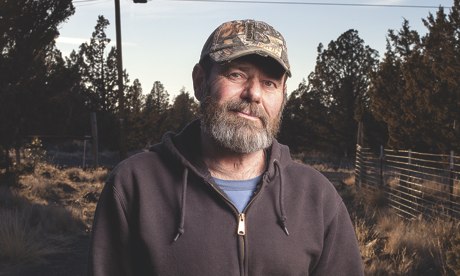
It began with Charlie going missing. He was a beautiful, smoky-grey, short-haired cat and he'd been gone for a couple of days. He could have gone anywhere: we live in a very rural area, at the foot of the Cascade mountains, 12 miles from the town of Prineville, Oregon.
It was a Saturday night when Charlie showed up on the porch, but something was wrong: he couldn't walk, his face was swollen and he seemed to be choking on something. When I looked, it was a mouse stuck in his mouth. When I tried to pull it out, Charlie accidentally bit my finger, then ran under the porch. When he came out the next day, he was clearly suffering. It was as if the mouse had died in his mouth and was rotting, and I was worried about bacteria. I called a friend over to put him down, then we buried him.
On the Monday I went to my job as usual, as a welder, but by mid-morning I started to feel very sick. It came on all of a sudden and I developed a high fever. At the emergency care clinic, they gave me a dose of antibiotics for cat-scratch fever. I quickly developed flu-like symptoms. I turned grey and my skin hurt. A few days later I was delirious and my wife took me back to the clinic. I was taken by ambulance to the nearest hospital and put in intensive care.
That evening a doctor told me he thought I had developed bubonic plague: I had glands under my arms the size of lemons and that's one of the symptoms. I knew rodents could carry the disease, but I didn't realise I could get it from my cat. I was told it originally came over on steamships from China in the 1900s, carried by the fleas on rats.
At 6am the next morning, I was put on a ventilator and taken by ambulance to another hospital. The last thing I remember is riding in that ambulance. I went downhill quickly and was put on full life support. Hooked up to a dialysis machine, I had collapsed lungs and at one point my heart stopped.
I was in a coma for 27 days, during which my hands and feet swelled up and began to turn black. When I finally woke up, I just remember feeling incredibly thirsty. My doctor told me I had developed all three stages of the plague: bubonic (the least lethal form, which infects the lymphatic system), pneumonic (which infects the lungs) and septicaemic (the bloodstream). Some people have survived bubonic plague, but not all three, apparently. Technically, I shouldn't be here.
The doctor said I'd probably lose my feet and hands, but all I could think about was how thirsty I was. They didn't let me drink anything for days because I had a tracheotomy and was being fed intravenously.
Eventually I understood the seriousness of what had happened: the day before I woke up from my coma, doctors had been talking about turning off my life support. My recovery shocked everybody. I'd been told I'd be on dialysis for the rest of my life, but I had one treatment and I recovered. Everything in my body did, except my hands and feet.
After a month in hospital, I went home. I had to live for six weeks with the dead fingers and toes, so doctors could work out which parts were going to heal before they performed the amputations. They wanted to take off my hands and feet at the wrists and ankles, but I didn't want that. Instead, they removed my fingers; I still have my hands and part of my thumbs. They took off all the toes on my left foot, and about a third of my right foot is gone.
The Centres for Disease Control and the health department came to look all around the house, but they found no dead rodents and no sign of the plague. They dug up the cat and sent his body off to a lab in North Carolina. He was infected with it, but it's hard to say where he picked it up. The disease is carried by a certain type of flea that lives on burrowing rodents such as mice and squirrels. A cat can cover a lot of ground in two days.
It's hard to believe it happened to me, but rather than feel depressed, I've always felt positive and happy to be alive. I was working 15 hours a day until I got sick. After my illness, I retired, but I'm still able to make hunting knives in my workshop as a hobby. I think it's just a fluke that I caught this. Now I hope to make people aware of the illness. If you know the symptoms and what to look for, you stand a much better chance of surviving.
• As told to Alex Hannaford
Do you have an experience to share? Email experience@theguardian.com

